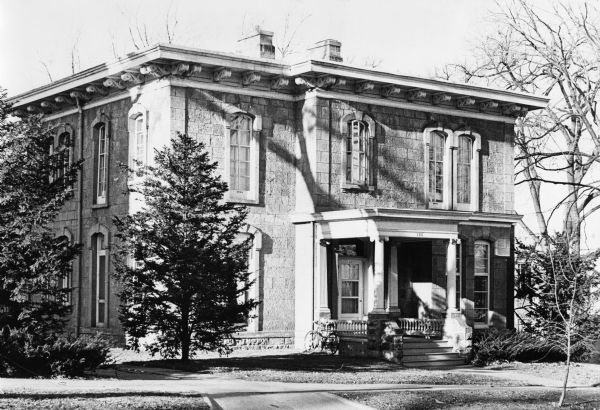“Behold the beautiful city of Madison, welcoming a body of women who come to deliberate on great questions.”
Lucy Stone, Woman’;s Journal, October 25, 1879
The Woman’s Journal, the women’s rights weekly paper founded by prominent suffragist Lucy Stone and her husband, Henry Blackwell, devoted significant space in three consecutive issues to cover the October 1879 Women’s Congress held in Madison. Lucy Stone wrote:
The existence of the Women’s Congress and the treatment it receives makes an epoch in the history of women…. Today behold the beautiful city of Madison, the capital of the great State of Wisconsin, welcoming to its legislative hall a body of women who come to deliberate on great questions. They sit with crowded sessions; their right to do so recognized; fair and appreciative reports of what they do are given to the real public which does not raise a question of propriety even, and their words are heeded. So much is settled. Who shall grow weary or doubt the final result for women, when so great changes are wrought in so short a time.
After reading her paper on penal legislation on Wednesday, October 8, Lavinia Goodell could relax a bit and enjoy the rest of the Congress. On Thursday, October 9, she wrote in her diary, “A grand day full of good things.” The Wisconsin State Journal reported that Lavinia gave comments at a session titled Women, in Business. Lavinia “wised to assure young ladies who had ambition to enter the legal profession, that there was no danger that there will be any lack of cases in court. It is a mistake to think that the chief work of a lawyer is in making speeches in court. The best paying work is of a different character. Don’t be discouraged, but come on.” In the evening Lavinia attended a reception hosted by Governor William Smith and his wife.
On Friday, October 10, after “a busy, pleasant day at the Congress, Lavinia attended a reception at the home of Senator and Mrs. Joseph Thorp. (The house still stands, at 130 East Gilman Street, Madison. From 1885 until 1950 the home served as Wisconsin’s governor’s mansion. Today it is a boutique hotel.

Senator Thorp was a wealthy lumber baron. His daughter, Sara, was married to the famous Norwegian violinist Ole Bull.

Mr. Bull treated his in-laws’ guests to a violin performance. The Wisconsin State Journal reported:
Here in the spacious and noble drawing room, recently refitted in exquisite taste, the ladies were hospitably welcomed by Mrs. Thorp and her son. Not far away the Apollo-like form of Mr. Ole Bull lifted his massive head and noble face above the crowd, where he and his accomplished wife gave their hearty welcome to the guests…. Ole Bull held them spellbound with his “Sicilian, Tarantelle,” his wife admirably accompanying him at the piano….
Before the company dispersed, Mrs. President Doggett, on behalf of the Congress, … thanked the kind host and hostess for this delightful reception in their charming home. She thanked Mr. and Mrs. Ole Bull for the music that had thrilled their hearts with holy memories of the past, and high aspirations for the future, and she declared that they had had such a good time in Madison they were almost ready to say they wanted to come again next year.
After a little farther exchange of friendly salutations, the large company slowly dispersed, while on every lip was the word, “What a delightful evening!”
On Saturday, October 11, Lavinia joined other delegates and friends on an excursion train that took them to Kilbourn City (now known as Wisconsin Dells). On arrival, the party boarded a steamer and visited the Dells’ attractions. Lavinia reported, “Splendid scenery, and a pleasant but fatiguing time.”
On Monday, October 13, Lavinia took the train back to Janesville. Her diary entry read, “Home again. Seems real good and wish I hadn’t got to go off. Came back with a lot of Congress women and had splendid journey. “
A month later, her health failing, Lavinia abruptly moved to Madison. Although we have no definitive record of when or why she made the move, it is possible that the week she spent at the Women’s Congress played a part in her decision. Her diary entries mention that during her October visit she spent time with “the Misses Bright,” who lived on Carroll Street. (She first reported meeting a Miss Bright during an August visit to Madison.) When she relocated to Madison in November, the first people she spent time with were the Misses Bright. Perhaps while attending the Women’s Congress Lavinia heeded Lucy Stone’s advice to “deliberate on great questions” and decided to make a significant life change. NK
Sources consulted: Annual Report of the Association for the Advancement of Women (1880); Woman’s Journal, October 25, 1879; Wisconsin State Journal; Lavinia Goodell’s diaries.







